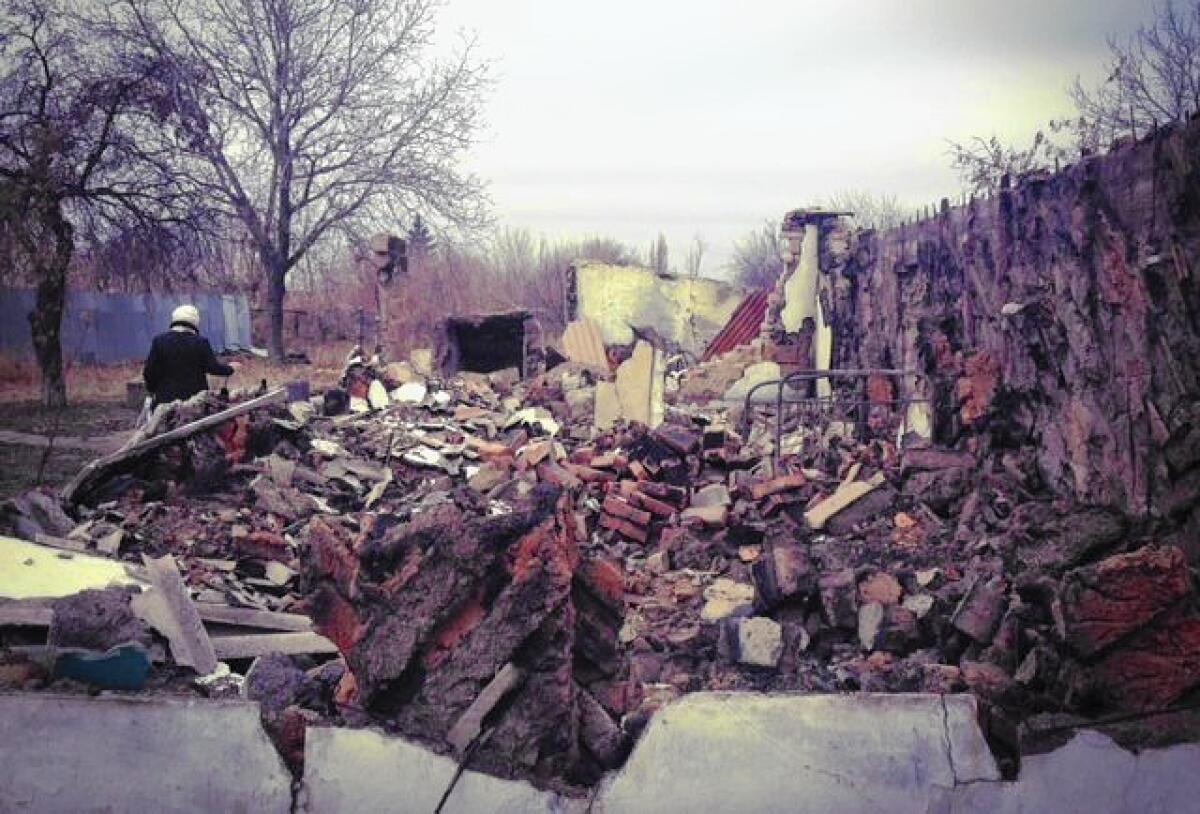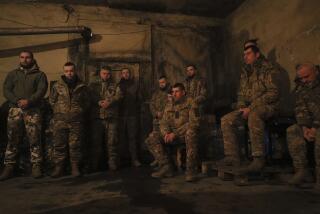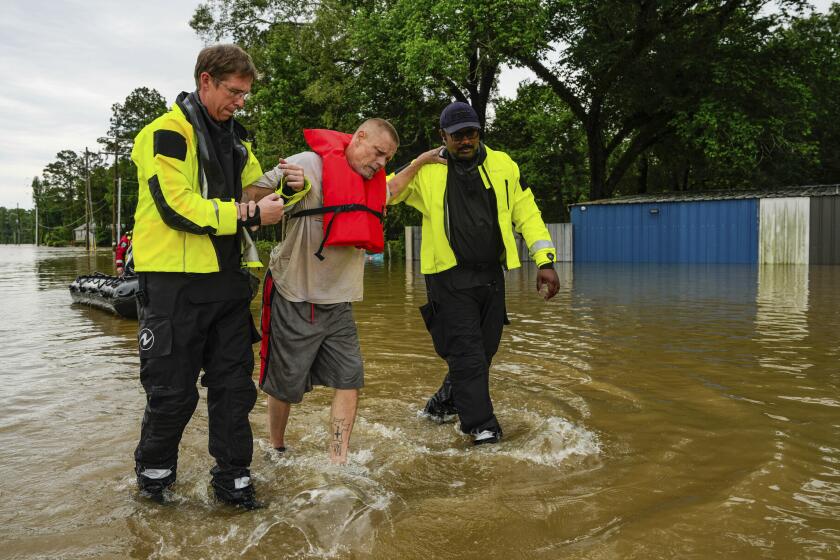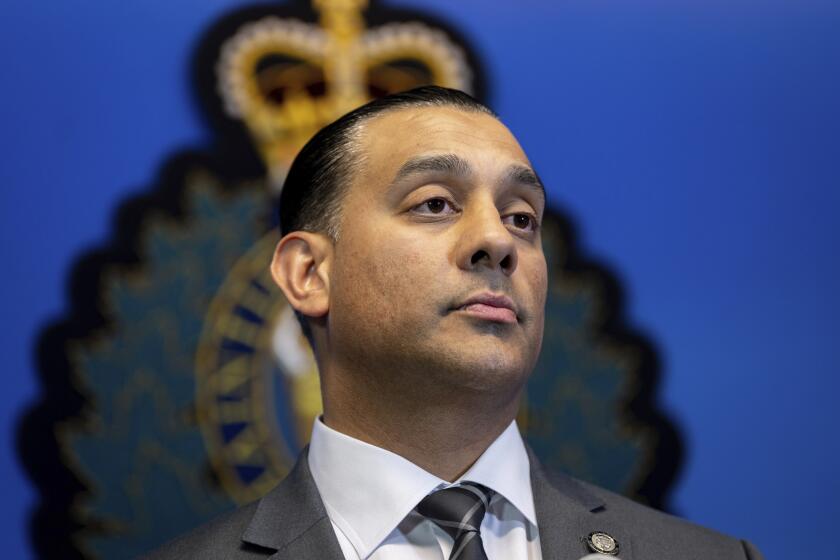In Ukraine’s east, support for the central government in Kiev is dying

A year ago, Luda Nesterenko didn’t give much thought to her nationality. With a Ukrainian mother and a Russian father, Nesterenko, like so many in this region of the former Soviet Union, is a mix of two Slavic cultures so close that she hardly felt the need to differentiate between them.
But that was before protesters gathered in the streets of the Ukrainian capital, Kiev, last November to demonstrate against a Kremlin-friendly president she didn’t particularly like but was willing to live with for stability’s sake. It was before those mass demonstrations ended in the ousting of that president, and Russia annexed Crimea. And it was before the war between Ukrainian government forces and pro-Russia separatist fighters came to her city.
On a recent day, Nesterenko, 47, wiped away tears as she stood next to the crater left by the artillery shell that ripped through the roof of her house on the corner of Komsomolsk and Transport streets. In a split second in mid-August, the shelling reduced her life savings down to its foundation.
“Who’s going to answer for this now? Which government?” she asked as she pointed to the rubble of the home where she and her two teenagers once lived. “We’re simple, hard-working people here. We never fought with anyone, but suddenly we are the enemy and it looks like [Ukrainian President Petro] Poroshenko just wants to kill us off.”
While the talk in Kiev is about defeating the pro-Russia separatists and reuniting the country, many here in eastern Ukraine say the central government has little chance of ever winning back their support. For eastern Ukrainians such as Nesterenko, communication from Kiev comes only in the form of artillery shells, and civilians are left to pick up the pieces the war leaves behind.
Frustration with Kiev deteriorated further when Poroshenko announced recently that he would completely cut off budget payments, state agencies and banking services in separatist-held territories.
The United Nations estimates that more than 1 million Ukrainians have left the conflict areas in the east. But more than 3 million remain in the areas controlled by the self-declared Donetsk and Luhansk people’s republics. Some of them say they stayed in their homes because they supported the separatists. Many others say they remained because they were too sick or too poor to depart, or couldn’t leave elderly relatives behind.
Today, in cities across the eastern regions, residents say the prevailing sense is that Kiev will no longer help Ukrainian citizens who have stayed because they had nowhere else to go.
“By my passport, I’m still a citizen of Ukraine, but Kiev seems to have completely forgotten about us,” Nesterenko said.
The impact of the financial freeze on the separatist-held territories could prove catastrophic. Government-paid workers including teachers, doctors and pensioners haven’t received their salaries for five months. Now, with local branches cut off from the central banking system in Kiev, there will be no way for residents in the separatist areas to withdraw cash from any accounts they might have left.
Without money for food and other basic needs, tens of thousands of eastern Ukrainians are relying on humanitarian aid packages shipped from Russia on truck convoys, which they receive after standing in line at separatist-controlled government buildings or offices. Last week, separatist leaders announced that they would establish their own pension fund, postal services and a system of banking networks. It is unclear how they would fund these services, but leaders have indicated that they will re-nationalize the region’s coal mines and heavy industries to provide jobs and tax revenue.
In almost every city and town, pensioners wait in lines in the cold to collect bags full of macaroni, canned milk and medical supplies, some of it donated by a local oligarch’s charity foundation.
“The people in Kiev responsible for this should be lined up against a wall and shot,” said Petr Panko, whose house in Ilovaisk was pockmarked with shrapnel scars from an artillery shell that destroyed his neighbor’s house.
Oleg Plahotin said an artillery shell hit his residence across from the town’s hospital on Aug. 16. The simple brick house was built in 1968, and Plahotin bought it two years ago from an elderly couple. He recently completed a remodeling project on the 1,200-square-foot home to modernize it for his wife and 12-year-old daughter.
“It was a great house … and now this,” he said as he cleared out the remaining debris from what was left of the interior.
Plahotin said he planned to rebuild.
Ilovaisk, a town of about 15,000, used to be a sleepy, regional railroad hub. But in August, it was the scene of some of the heaviest fighting of the now 7-month-long conflict between pro-Russia separatists and Ukrainian forces. A fragile cease-fire has been in place since Sept. 5, though daily firefights and artillery shelling occur about 40 miles from Ilovaisk’s center.
In late August, Ilovaisk’s civilian population emerged shell shocked from the fighting. They saw the separatist forces as their only hope for protection against what the Russian media convinced them was a Ukrainian nationalist “junta” determined to eradicate Russian-speaking parts of the country.
Plahotin, like Nesterenko, hadn’t paid much attention to his nationality before the conflict started. His brothers and sisters live in the central Ukrainian city of Vinnytsia, where Poroshenko grew up. Today, relations are strained between the siblings in their increasingly infrequent telephone conversations.
“They think the people here are their enemies, and people here think the same about them in the west,” Plahotin, 40, said. “They live closer to Kiev, so their sympathies are on that side. I don’t think it will ever be possible for Ukraine to be united again.”
In the western and central regions of Ukraine, the crisis fostered a newfound sense of patriotism in a country still struggling to find a national identity after 23 years of independence. Snap elections ushered in a European-leaning president and parliament, both promising to combat the country’s endemic corruption and lead the population of 46 million into the European Union.
But the crisis has ripped apart families, creating generational divides pitting parents nostalgic for the Soviet past against their European-focused children. The economy is in tatters and will need billions of dollars in international aid to remain afloat. The Ukrainian hryvnia has lost nearly 50% of its value.
Many eastern Ukrainians say they are victims caught in the middle of an ideological battle between Russia and the West.
“Ukraine thinks that it is at war with Russia, Russia thinks it is at war with the United States, and the people in Donbas just want to know why all this is happening in their house,” said Zhenya Shibalov, a journalist from Donetsk.
Ayres is a special correspondent.
More to Read
Start your day right
Sign up for Essential California for news, features and recommendations from the L.A. Times and beyond in your inbox six days a week.
You may occasionally receive promotional content from the Los Angeles Times.







